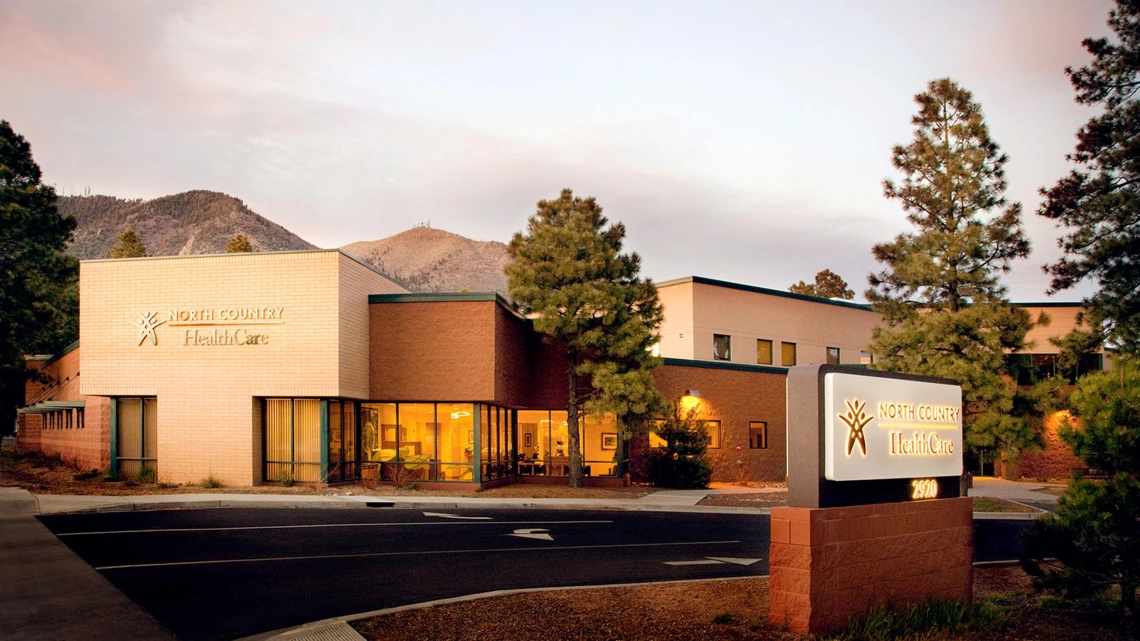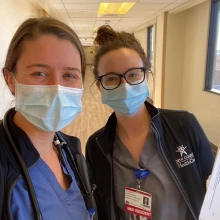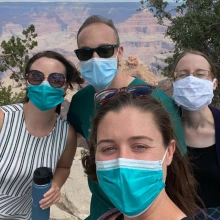New Family Medicine Residency Serves Rural Northern Arizona
Partnership between College of Medicine – Phoenix and North Country HealthCare brings students to Flagstaff and underserved remote areas.

North Country Health Care is partnering with the College of Medicine – Phoenix to offer doctors the opportunity to complete their residencies in underserved communities in Northern Arizona.
The physician shortage in rural areas is one of the top issues in health care in Arizona, and the College of Medicine – Phoenix is working to solve it by training physician residents in rural communities of Northern Arizona.

Dr. Tasha Harder and Dr. Elizabeth Curtiss doing their rotation at Flagstaff Medical Center.
“We know that resident physicians are likely to practice where they completed residency training, so this program's rural focus will have a big impact over time,” said Jonathan Cartsonis, MD, director of the Rural Health Professions Program at the college.
The residents will spend three years in training, treating patients in up to 13 diverse rural communities in the program, which is a partnership between the college and the Colorado Plateau Family & Community Medicine Residency at North Country HealthCare.
Serving a great need
More than 70,000 people live in Flagstaff, the primary location of the residency, and residents will travel across northern Arizona to provide care in communities such as Winslow, Show Low, Williams, Tuba City, Polacca and Whiteriver. This is one of only a few residency training programs in the country with required rotations in Indian Country. The residents will be exposed to all aspects of rural medicine, from urgent care rotations at the Grand Canyon National Park, to primary care at Native American reservations.
“We don’t have nearly enough primary care providers in rural northern Arizona.”Edward Paul, MD, director of the College of Medicine – Phoenix Family Medicine Residency Program
“We don’t have nearly enough primary care providers in rural northern Arizona,” said Edward Paul, MD, director of the Family Medicine Residency program. “The goal is to train high quality family physicians with high hopes that they will stay in our region. Small towns across the northern third of our state are in desperate need of primary care physicians. Whether they stay in Flagstaff or not, our goal is to keep our residency graduates in northern Arizona; our training is oriented that way.”
The Family Medicine Residency is embedded in the community through all three years of the curriculum. In the few months since the first cohort began working in Northern Arizona, the residents have been involved with Flagstaff’s community food banks, shelters and behavioral health organizations.
“Community involvement is critical as it allows residents to see the full spectrum of care and health challenges patients may face in these rural areas,” Dr. Paul said. “We want our residents to get to know the Flagstaff area, but also the rural communities where they will rotate in northern Arizona.”
Changing the future of health care in rural communities
Dr. Cartisonis and Katie Brite, MD, associate dean of Clinical and Competency Based Education at the College of Medicine – Phoenix, were instrumental in helping create the program with the goal to improve the physician shortage in rural Arizona and provide additional educational opportunities for College of Medicine – Phoenix students.
“The opening of the Colorado Plateau-Flagstaff residency is a big development for physician recruitment in rural Arizona communities,” Dr. Cartsonis said. “Rural doctors are aging, most are in their mid-50s, and many are expected to retire within the next decade. For rural health systems, that's insult to injury when you consider rural areas already struggle with physician shortages.”
It also helps patients connect with doctors who can relate to their rural life experiences.
“The residency is a great opportunity for UArizona medical students from rural areas to prepare for the type of practice they will encounter once they complete their studies.”
Significant economic and health care impact projected
Arizona is facing a severe doctor shortage across all counties, especially in primary care. This shortage is more prominent in rural Arizona and is predicted to worsen. With a dearth of primary-care physicians, rural Arizona is faced with overworked and stressed physicians, a lack of coverage in underserved areas, time constraints on patient-providers interactions, and prolonged wait times before consultations.

College of Medicine – Phoenix medical residents visit the Grand Canyon during their rotation to a clinic at the National Park in their first few months working in Northern Arizona. From left: Elizabeth Curtiss, MD, Dan Shtutman, DO, Tasha Harder, DO, Lauren Weinand, MD.
The three core faculty members of the program include Dr. Paul and North Country physicians Brandon Abbott, DO, and Bethany Davis, MD.
They are part of an interdisciplinary team that works with residents to help them gain clinical experiences in the community health centers. Residents work alongside providers and staff who are committed to serving others and caring for the whole person. They learn to care for high-needs patients who have limited resources and limited access to care. They have the opportunity to treat a diverse group of patients in the full spectrum of their illness and social milieu while being supported by a diverse staff who assist patients and families through a well-developed community outreach network.
In 2019, North Country and the Arizona Hospital and Healthcare Association (AzHHA) commissioned an economic impact study to ascertain how a family medicine residency program would affect the economy and patient access to care. The result of the independent economic-impact study shows “significant positive economic impact” to the state and expanded patient access to care over the next ten years. The study estimates that increasing the number of physician residents at North Country HealthCare alone will result in 136 high-paying jobs and $151.7 million in economic output for northern Arizona over a ten-year period.

